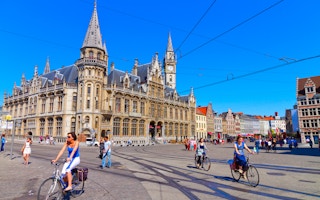Tourists from Asia Pacific are projected to spend nearly $753 billion by 2023, bumping up the region’s share of global spend to 40 per cent from 25 per cent in 2012. The more people traveling frequently, the greater the carbon footprint being generated. This carries potentially harmful implications for the global environment.
To continue reading, subscribe to Eco‑Business.
There's something for everyone. We offer a range of subscription plans.
- Access our stories and receive our Insights Weekly newsletter with the free EB Member plan.
- Unlock unlimited access to our content and archive with EB Circle.
- Publish your content with EB Premium.
Here are some quick tips on how you can help reduce your carbon footprint as a traveler during your next trip:
- Book hotels with sustainable reputations
Find out if the property you plan to stay at is eco-friendly. Certifications such as 14001 (environmental management), 50001 (energy management), and 9001 (quality management) indicate that a hotel is committed to such practices. - Choose sustainably sourced food
Look for restaurants that incorporate local, organic or sustainably grown food. Find out if the ingredients are sustainably harvested with no harmful impact on the natural ecosystem. By doing so, not only are you supporting the local food producers, you are also helping to preserve the natural food supply chain.
- Travel around town like a local
Instead of renting a car, try biking, walking or taking public transportation to explore a new city. You will reduce your carbon footprint, and get to experience the city through the eyes of a resident, uncovering hidden gems during your exploration. - Buy ethically
One of the simplest ways to travel sustainably is to shop in a responsible manner. Choose products that respect the environment, respect human beings, and are organic – check the tags to find out where the product was made and what it’s made of.
- Go digital
Thanks to the advancement of technology, mobile check-in using electronic boarding passes is increasingly common. Similarly for hotels, invoices are now emailed to guests. Saving paper can be done through digitizing as many of your travel documents as possible so as to reduce your waste. If you do need to use papers for your travel documents, ensure that they get recycled. - Conserving energy
Remember to switch off the light and air conditioning before leaving your hotel room. You can also opt to use natural lighting by drawing back the curtains to allow natural light into the room.
It’s not just about guests – hotels are equally responsible. For example, all 4,200 Hilton Worldwide hotels around the world are ISO 14001 (environmental management), 50001 (energy management), and 9001 (quality management) certified. Through a collaboration for a soap recycling program between 16 of our properties across Asia Pacific and our like-minded partners, together – as of September 2014 – we created more than 175,000 new bars of soap from more than 7,000kg used soap that have been collected since 2013.These bars of soap were then distributed to vulnerable communities in the Philippines, Cambodia, Thailand, and other countries across Asia.
Always remember, small changes in your actions on the road can go a long way towards conserving the environment and local community around you.
Martin Rinck is president, Asia-Pacific, Hilton Worldwide. This article was written exclusively for Eco-Business.











